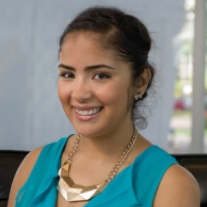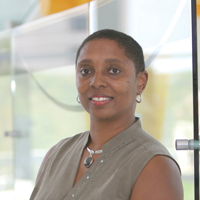Profiles in Computing: Yerika Jimenez
By Shar Steed, CRA Communications Specialist

As a little girl growing up in the Dominican Republic, Yerika Jimenez, currently a Ph.D. student in computing at the University of Florida, noticed she had a knack for fixing things – cell phones, TVs, radios. Everyone in her community would bring her broken items, and she would return them repaired. A few years later, when Jimenez was nine years old, her family settled in New Jersey, and her fascination with technology continued.
“I was very curious growing up. I remember when I first came to the US, I used a technology tool to learn how to read and write English, and I was amazed.” It was Jimenez’s first interaction with learning using a technology tool, and it inspired her passion for understanding how students learn computer science from a cognitive perspective. Her research focuses on human centered computing, with a concentration on child-computer interaction.
Jimenez remembers how hard it was for her to understand how to code, and wants to discover which tools work best for others to learn how to do it. “We have amazing block based programming environments like Alice and Scratch, but we don’t know how much time it is taking students to understand the interface and how to code in that interface.”
Jimenez has had the opportunity to participate in several of CRA’s Committee on the Status of Women in Computing Research (CRA-W) programs. As an undergraduate student studying computer science at Kean University she participated in both the Collaborative Research Experience for Undergraduates (CREU) and Distributed Research Experiences for Undergraduates (DREU). In 2011, Jimenez’s CREU research team published the paper, “Attracting High School Students to Computing: A Case Study with Drag-Drop Interfaces,” based on research from the project. In 2013, her DREU at the Engaging Learning Lab at Clemson University investigated how African Americans students’ engagement with technology through mobile apps and visitations to South Carolina’s African American historical sites can promote learning in history education. During this DREU session, she also helped implement a study of a physical computing summer camp for middle and high school students.
From these research experiences, Jimenez learned how to work on a team, and the value of accepting criticism and feedback. “Constructive criticism can help you grow as a researcher and as a person. Also, your peers can encourage you to think differently since they have unique experiences, skills, and different points of view. They can help you improve and shape your research.”
Being a first generation graduate student, Jimenez felt overwhelmed. In 2015, her first year in graduate school, she attended CRA-W Graduate Student Cohort (Grad Cohort) and discovered that she was not alone. “It was a big transition period going from undergraduate straight to graduate school. But at Grad Cohort, I realized that other women were feeling and going through the same thing too, and that it was ok. It’s good to have that support system and not be embarrassed about sharing your feelings.”
Jimenez reflected on times as an undergrad, being the only woman in the classroom, and having male students ask why she was there, saying she didn’t belong and making her prove herself. Jimenez felt that she always needed to be on her “A game” all of the time.
Grad Cohort helped Jimenez develop a support system to encourage her to continue her graduate program, and she has the desire to help others by sharing what she has learned from her experiences. Her advice to individuals from underrepresented groups: “Always believe in yourself. Find a mentor to help you develop your skills. Just because you don’t see the finish line, it doesn’t mean that you are not going to make it there. It is more about the journey than the destination. You will have many challenges, but you can over come them.”
After she earns her Ph.D., Jimenez plans to become a faculty member at a research institution because she enjoys teaching and wants to continue doing research. Jimenez also has the desire to mentor students, with a focus on minorities and women, and help them find their passion. “I really want to mentor the next generation of scientists, and I want them to understand the importance of graduate school and obtaining a Ph.D. because it gives you the opportunity to impact a lot of lives.”
Part of the mission of the Computing Research Association (CRA) is to mentor and cultivate the talent development of computing researchers at all levels. Several programs led by the Committee on the Status of Women in Computing Research (CRA-W) focus on increasing gender diversity in computing. This new column, “Profiles in Computing,” showcases successful women in computing, who donate their time and energy to mentoring future generations and strengthening the community of female computing researchers through CRA-W initiatives.



